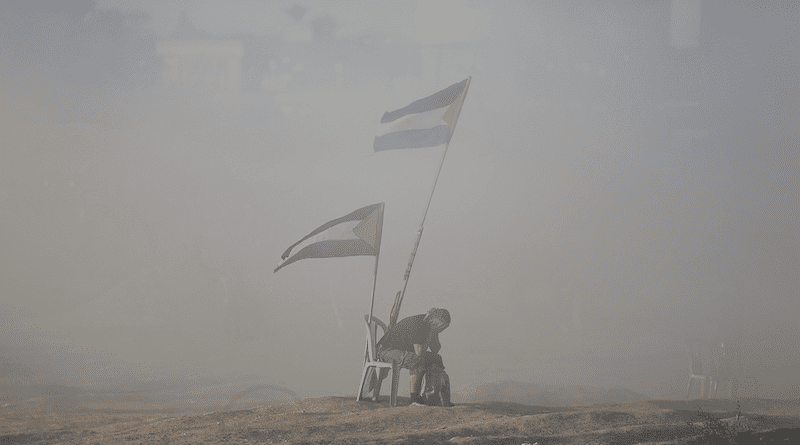US Legislator Finds Himself In The Jaws Of Israeli-Palestinian Injustice
By Ray Hanania
Since the beginning of the year, following the formation of the most right-wing government in Israel’s history, between 130 and 160 Palestinians and 24 to 40 Israelis have been killed. Despite the lopsided nature of these numbers, with about five times more Palestinians killed than Israelis, the Western news media largely continues to treat the Israelis as victims and Palestinians as terrorists.
When Palestinians are killed, news outlets generally describe them as mere statistics and numbers that continue to grow, blurring their humanity and discouraging any sympathy. However, when Israelis are killed, media reports describe them in the most humanistic terms and include details such as their name and age, even detailing their hopes and dreams.
This is a familiar cycle that is repeated time and time again.
On June 19, Israeli forces stormed the Jenin refugee camp in the West Bank, killing five Palestinians and injuring 91 others. The violence was described by most Western news media as a mere continuation of the tensions between Israelis and Palestinians. Several days later, four Israeli settlers were killed by Palestinians, but this time the killings made national headlines.
Such unbalanced media coverage reinforced an atmosphere of public shock and anger against the Palestinians. The next day, hundreds of armed Israeli settlers targeted a village north of Jerusalem in the West Bank called Turmus Ayya, rampaging in what many Palestinians described as a pogrom, firing guns at homes and killing one Palestinian and injuring more than a dozen others. Mayor Lafi Adeeb said that 30 homes and 60 cars were damaged or destroyed by fire.
But the pogrom in Turmus Ayya also created an opportunity for Palestinians to balance the media scales. One of the Palestinians who found himself in the middle of the pogrom was Abdelnasser Rashid, a Harvard-educated community leader from Chicago, who was elected last November to become the first Palestinian and Muslim member of the Illinois General Assembly. Rashid was visiting family members in the village when the armed settlers began their rampage.
Rashid’s story of finding himself in the middle of this horrific violent act became the cornerstone of some US media interest, mainly in Chicago, where several TV stations reported on the violence and his fears. He told the Chicago media and Arab News that he was with his seven-year-old daughter at the time and she feared for her life as gunfire echoed throughout the village.
His justified fear provoked him to write a two-page letter to share his experience with other members of the Illinois General Assembly. Rashid wrote: “I was in the nearby city of Ramallah on Wednesday, June 21 running errands when I got a frantic call from my mom. She said the village was under attack by a mob of armed Israeli settlers. As we spoke, my phone was inundated with videos and pictures of the live attack. I got off the phone and began contacting the US Embassy, the State Department and others.
“The next day, Thursday, I’ll never forget the feeling I got when I saw a text message saying settlers were back — this time in my neighborhood … Then the gunshots started and we knew we needed to stay inside. I ran outside yelling for my family to get inside. We barricaded doors, closed windows, and started making a safety plan. My seven-year-old daughter held on to me tight and asked, crying: ‘What do we do if we get shot?’ I truly did not know during this period whether we would be killed.”
Rashid said he had to speak to his young children and explain “that the Israeli government does not believe we deserve equal rights, that we have to be especially careful because we can be hurt or even killed with no accountability or consequences.”
Several legislative colleagues responded with personal messages sympathizing with him over his experience. But when I tried to contact legislators to speak publicly about the violence and Rashid’s horrific experience, most said they feared wading into an issue in which they would likely be denounced as antisemitic for criticizing Israel.
That is another bias in America, one embraced by much of the Western news media — the assertion that criticizing the government of Israel equates to anti-Jewish hate. That cannot be taken lightly. Illinois was one of the first of the 35 American states that have adopted legislation aimed at punishing anyone who criticizes or boycotts Israel, a foreign country.
Rashid also complained to the US State Department. Without mentioning his eyewitness account, the State Department expressed concerns about escalating violence “on both sides.” Spokesperson Vedant Patel spoke of outrage over the “terrorist” killing of the four Israelis, adding that the White House is “deeply concerned by the rising levels of violence in the West Bank in recent months.” That phrase, “rising levels of violence,” references the faceless 130 to 160 Palestinian fatalities as dehumanized statistics.
Although Patel also noted the “troubling reports of extremist settler violence,” the statement did not go much further on that subject.
The American-Arab Anti-Discrimination Committee, which monitors discrimination against Arabs, called on the Justice Department and the Biden administration to investigate the role American-Israeli settlers played in the killings, arson and violence.
The Israeli-Palestinian conflict is more than just a violent war taking lives on both sides, although one side more than the other. It is a portrayal of how news media spin can blunt justice for some while exaggerating it for others.

